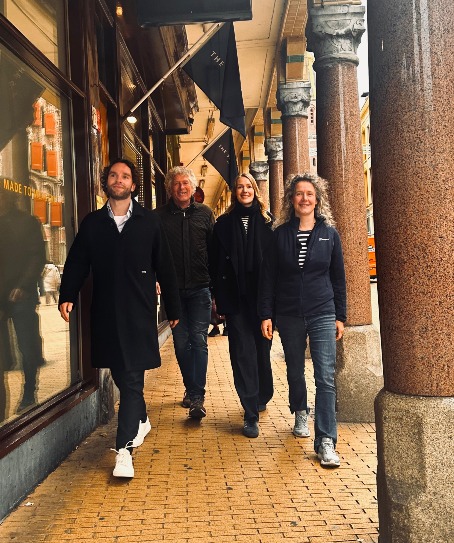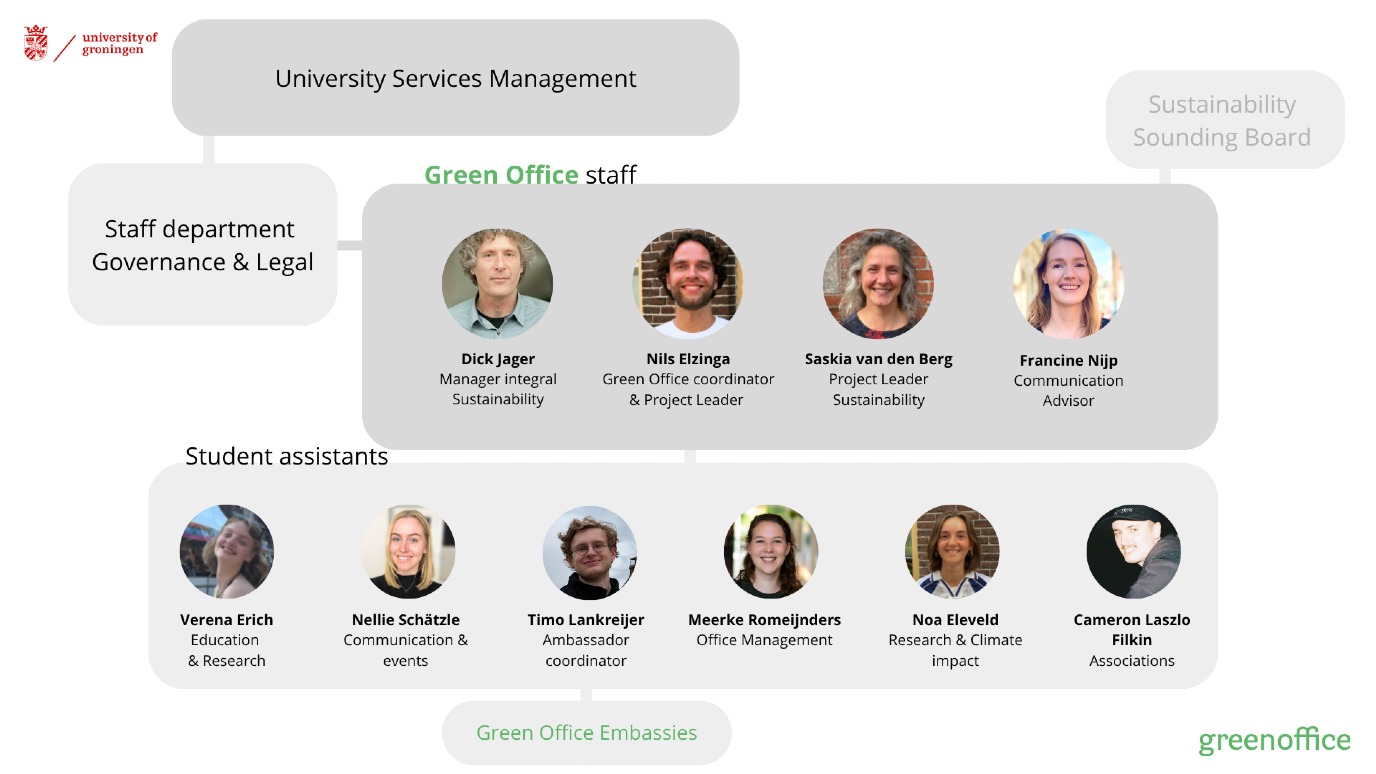About the Green Office
The Green Office celebrated its eleventh anniversary in 2025. In recent years, the role of the Green Office has changed dramatically and sustainability has taken a prominent place within the University. Sustainability is one of the core values of the University of Groningen, as stated in the Strategic Plan. The theme is reflected in education & research and is of great importance for the University's business operations.
What does the Green Office do?
The Green Office coordinates and initiates activities for the sustainable development of the University and is the author of the UG's sustainability policy (Sustainability Roadmap 2021-2026). The working method is based on (new) legislation in the field of sustainability, the Netherlands Climate Agreement, the Sustainable Development Goals of the United Nations and local agreements such as the Groningen Agreement.
In addition to their regular tasks, all Green Office staff regularly initiate new projects and are involved in UG-wide developments. This could include tenders, policy formation or organizing meetings.

Stimulate and connect
The Green Office leads the University's sustainable agenda from an advisory, stimulating, and policy-making role. The Green Office also has a networking function, both within and outside the organization, and thus connects academics, students, services and external parties. The Green Office team initiates and coordinates a wide range of sustainability projects, often in collaboration with various stakeholders within and outside the organization.
To ensure that the UG maintains and promotes its sustainable image, the Green Office is responsible for annually participating in (international) rankings, organizing events and distributing information.
Going from a programme to a department
The Green Office has been given a new place within the organization as of 1 June. In order to be able to work optimally on integral sustainability within the university, a new and more central position has been chosen. The Green Office was previously part of the Campus & Community cluster as a programme, but will now continue as part of the staff department at Governance & Legal, under the board of University Services.

Collaboration and partners
The Green Office collaborates with clusters, services and faculties on various themes, such as education & research, student participation, making laboratories more sustainable and UG-wide communication. Outside the UG, the Green Office collaborates with other universities, the municipality, the province and regional and international partners, such as ENLIGHT and the Guild network.
Because the Green Office works closely with academics, student assistants and interns, and offers the opportunity for research projects in the form of Living Labs, there is room for critical and new perspectives and the emergence of original ideas.
The Green Office and student participation
The Green Office offers students the opportunity to commit to sustainability by conducting research in Living Labs (Master and Bachelor). For example, in 2023, 21 projects were carried out: 5 Honors projects, 5 Bachelor's theses, 1 Master's thesis, 4 group assignments, 4 internships, 1 full course and 1 employee survey.
Students can also join the growing Green Ambassadors network. The Green Office also offers subsidies and a label program for making student organizations more sustainable. By the end of 2023, more than 170 students were actively involved in making the RUG more sustainable through the Green Office Ambassador Programme. In the academic year 2022-2023, 41 associations participated in the label program and 41 associations applied for a sustainability subsidy.
Origin of the Green Office
Before the Green Office was created, there was an Environmental Sounding Board Group within the UG (1996) and later, from 2010, a UG Sustainability Steering Group. In 2010, the priority was to focus on sustainable energy (in business operations and as a theme for education & research) and to profile the UG as a sustainable university. A policy vision was drawn up on behalf of the Board of the University to achieve this. Following this, the Sustainability Programme Manager was appointed at the end of 2013. In August 2014, the Green University Task Group was appointed by the Board, and the Green Office was established at the same time.
Student team
The Green Office started as a student-run team (much like Green Offices at other universities), tasked with coordinating and facilitating activities and projects related to sustainability. The funding for both the Green Office and the Green University Task Group initially ran until 2020. The UG's motto in the field of sustainability for that period was 'From following (2015) to leading in 2020'.
Sustainability as a value
The way the Green Office functions has changed drastically over the past ten years. Firstly, after the first roadmap period, the Green University Task Group continued together with the student team under one name as the Green Office. Secondly, both the scope and impact of the projects and policies that the Green Office works on have increasingly grown, and sustainability has been anchored as a value in the organization.
Sustainability in the DNA of the University
In 2020, the programme budget for the Green Office was again allocated for the period of the current Sustainability Roadmap, which runs from 2021 to 2026. In this roadmap, the ambition is 'Sustainability in the DNA of the University'. In line with the new Strategic Plan, a new Roadmap will be drawn up for the period 2025-2030.
From 2014 to 2022, the Green Office was part of the AMD (Arbo, Environment and Sustainability service). After that, from 2022 to june 2025, the Green Office was positioned in the cluster Campus & Community. The Green Office is now a part of the staff department Governance & Legal, under the board of University Services.
